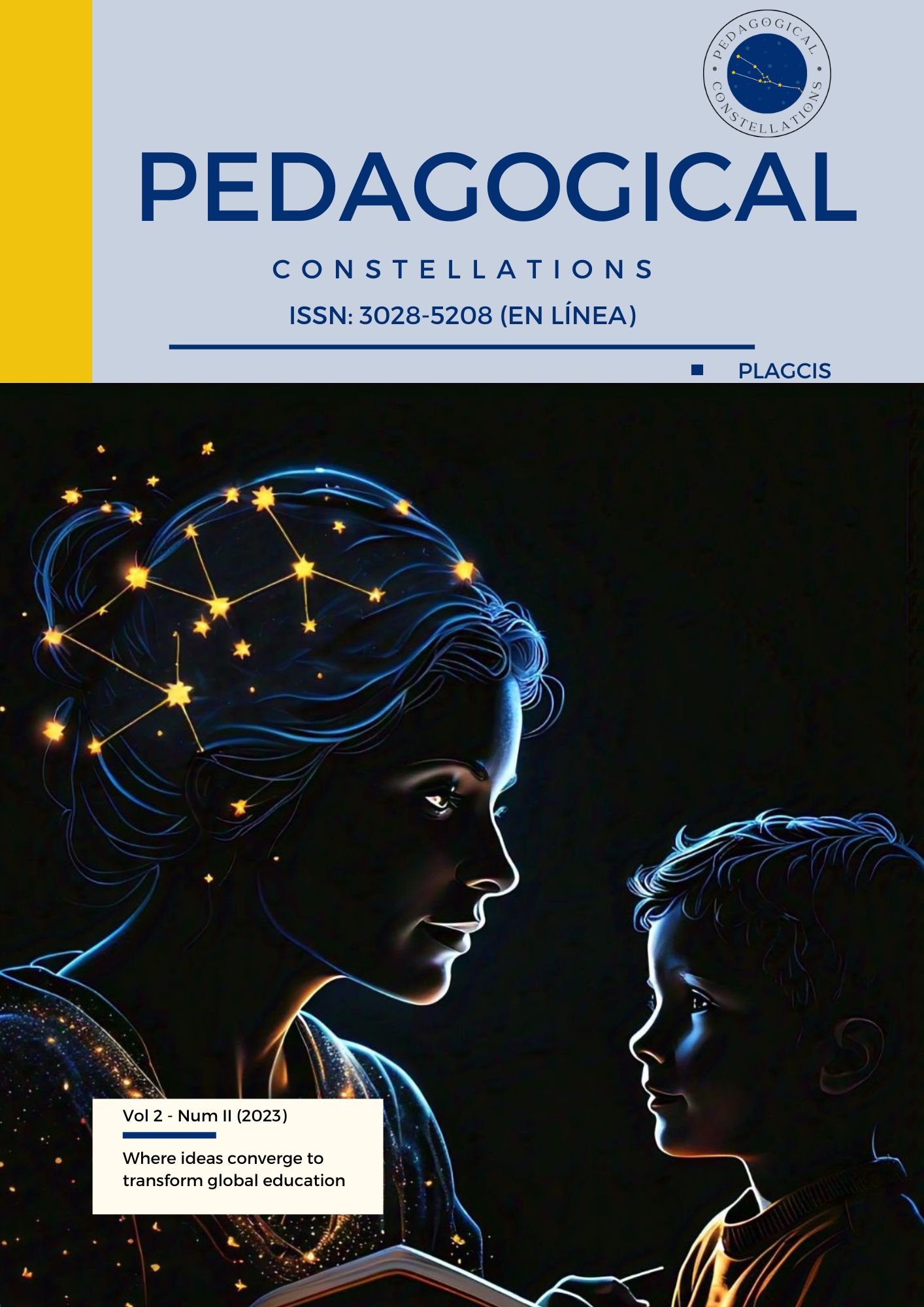Technological innovation in education
DOI:
https://doi.org/10.69821/constellations.v2i2.12Keywords:
Education, connectivism, education, innovation, social interactionAbstract
The educational area lives in a constant process of change, adapting to new concepts of technology, educational platforms and all innovation that is based on satisfying the needs of society. Concepts such as technology, innovation, social interaction, the digital age, have become inseparable elements of the educational fact in recent decades, and are so closely related that they can no longer be conceived without the other, their continuous analysis of interrelation is therefore necessary for a better adaptation and provision of the educational service.
Downloads
References
Araya-Muñoz, I. and Majano-Benavides, J. (2022). Didáctica universitaria en entornos virtuales. experiencia en ciencias sociales. Revista Electrónica Educare, 26(3), 1-19. https://doi.org/10.15359/ree.26-3.28 DOI: https://doi.org/10.15359/ree.26-3.28
Bustamante, S., Pérez, F., & Maldonado, M. (2007). Educación, ciencia, tecnología e innovación: Formación para un nuevo ordenamiento social. Educere, 11(38), 511-518. https://ve.scielo.org/scielo.php?pid=S1316-49102007000300018&script=sci_abstract
Durán, M. (2023). Innovaciones tecnológicas de comunicación e información utilizadas en la educación superior en época de pandemia: una revisión sistemática. Latam Revista Latinoamericana De Ciencias Sociales Y Humanidades, 4(6). https://doi.org/10.56712/latam.v4i6.1441 DOI: https://doi.org/10.56712/latam.v4i6.1441
Guillen, L., Quintanilla-Ferrufino, G., Palma-Vallejo, M., & Guillen, M. (2021). Workload in a group of Latin American teachers during the covid-19 pandemic. Uniciencia, 35(2), 1-13. https://doi.org/10.15359/ru.35-2.15 DOI: https://doi.org/10.15359/ru.35-2.15
Hilliger, I. (2024). Applications of learning analytics in latin america. Journal of Learning Analytics, 11(1), 1-5. https://doi.org/10.18608/jla.2024.8409 DOI: https://doi.org/10.18608/jla.2024.8409
Huamani Huaranca, L. (2023). Innovación tecnológica y empleo: análisis del impacto de la innovación tecnológica en el empleo para las pequeñas, medianas y grandes empresas del Perú. https://doi.org/10.37811/cl_w825 DOI: https://doi.org/10.37811/cl_w825
Maldonado, D. (2020). Educación jurídica e innovación tecnológica: un ensayo crítico. Revista Direito Gv, 16(1). https://doi.org/10.1590/2317-6172201954 DOI: https://doi.org/10.1590/2317-6172201954
Mancilla-Caceres, J. and Estrada-Villalta, S. (2022). The ethical considerations of ai in Latin America. Digital Society, 1(2). https://doi.org/10.1007/s44206-022-00018-y DOI: https://doi.org/10.1007/s44206-022-00018-y
Martí, S. (2023). Real-world evidence: experiences and challenges for decision making in Latin America. International Journal of Technology Assessment in Health Care, 39(1). https://doi.org/10.1017/s0266462323002647 DOI: https://doi.org/10.1017/S0266462323002647
Ordoñez, L. (2007). El desarrollo tecnológico en la historia. Areté, 19(2), 187-209. https://doi.org/10.18800/arete.200702.001 DOI: https://doi.org/10.18800/arete.200702.001
Ortiz, J., & Correa, T. (2020). Aspectos pedagógicos del colectivismo con redes sociales y ecología del aprendizaje. Revista Brasileña de Educación, 25. https://doi.org/10.1590/S1413-24782020250026 DOI: https://doi.org/10.1590/s1413-24782020250026
Rajab, M., Gazal, A., & Alkattan, K. (2020). Challenges to online medical education during the covid-19 pandemic. Cureus. https://doi.org/10.7759/cureus.8966 DOI: https://doi.org/10.7759/cureus.8966
Ramírez, A., Escalante, M., & León, A. (2008). La educación en tecnología: Un reto para la educación básica venezolana. Educere, 12(43), 731-740. https://ve.scielo.org/scielo.php?pid=S1316-49102008000400009&script=sci_abstract
Sarmiento Montoya, L. M., Cortez Macias, L. D., Moreira Santos, M. G., & Dau Villafuerte, R. F. (2023). Una experiencia de las TIC en las aulas virtuales. RECIMUNDO, 7(3), 238-246. https://doi.org/10.26820/recimundo/7.(3).sep.2023.238-246 DOI: https://doi.org/10.26820/recimundo/7.(3).sep.2023.238-246
Sato, S. (2023). Psychological impacts of teaching models on ibero-american educators during covid-19. Behavioral Sciences, 13(12), 957. https://doi.org/10.3390/bs13120957 DOI: https://doi.org/10.3390/bs13120957
Solórzano, F., & García, A. (2016). Fundamentos del aprendizaje en red desde el colectivismo y la teoría de la actividad. Revista Cubana de Educación Superior, 35(3), 98-112. http://scielo.sld.cu/scielo.php?script=sci_arttext&pid=S0257-43142016000300008
Sosa Meza, G. A. ., & Reina Muñoz, N. M. P. . (2021). Prácticas innovadoras en la educación superior durante la pandemia de la COVID-19. Revista Científica Internacional, 5(1), 11–23. https://doi.org/10.46734/revcientifica.v5i1.50 DOI: https://doi.org/10.46734/revcientifica.v5i1.50
Teräs, M., Suoranta, J., Teräs, H., & Curcher, M. (2020). Post-covid-19 education and education technology ‘solutionism’: a seller’s market. Postdigital Science and Education, 2(3), 863-878. https://doi.org/10.1007/s42438-020-00164-x DOI: https://doi.org/10.1007/s42438-020-00164-x
Vásquez Zamora, L. G., Herrera Vinelli, I. P., Cobeña Talledo, R. A., & Peralta Beltrán, A. R. (2023). Gestión del proceso de innovación de las prácticas de enseñanza en instituciones educativas. RECIMUNDO, 7(1), 468-477. https://doi.org/10.26820/recimundo/7.(1).enero.2023.468-477 DOI: https://doi.org/10.26820/recimundo/7.(1).enero.2023.468-477
Zapata-Cantú, L. and Gonzalez, F. (2021). Challenges for innovation and sustainable development in latin america: the significance of institutions and human capital. Sustainability, 13(7), 4077. https://doi.org/10.3390/su13074077 DOI: https://doi.org/10.3390/su13074077
Downloads
Published
Issue
Section
License
Copyright (c) 2023 Rosandra Coromoto Salazar Marcano (Autor/a)

This work is licensed under a Creative Commons Attribution 4.0 International License.
Authors who publish with this journal agree to the following terms:
- Authors retain copyright and grant the journal right of first publication with the work simultaneously licensed under a Creative Commons Attribution License 4.0 that allows others to share the work with an acknowledgement of the work's authorship and initial publication in this journal.
- Authors are able to enter into separate, additional contractual arrangements for the non-exclusive distribution of the journal's published version of the work (e.g., post it to an institutional repository or publish it in a book), with an acknowledgement of its initial publication in this journal.
- Authors are permitted and encouraged to post their work online (e.g., in institutional repositories or on their website) prior to and during the submission process, as it can lead to productive exchanges, as well as earlier and greater citation of published work.




